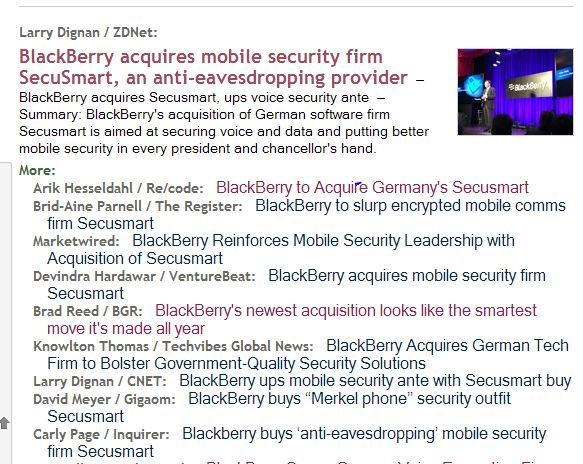The Tuesday announcement that BlackBerry is acquiring mobile encryption company Secusmart is stirring up the technology corners of the web, as reporters and analysts recognize the significance of the move.
Secusmart, a leader in high-security voice and data encryption and anti-eavesdropping solutions for government organizations, enterprises and telecommunications service, was BlackBerry’s partner in designing German Chancellor Angela Merkel’s headline-grabbing, ultra-secure phone.
Details were revealed in a press release and at this week’s BlackBerry Security Summit in Manhattan, and they are having quite an impact on those watching the developments. See the screenshot from influential technology news aggregator, Techmeme.com, from Tuesday.
As VentureBeat’s Devindra Hardawar wrote: “[The] Secusmart acquisition offers something unique for mobile security . . . Secusmart can secure just about every aspect of mobile device communications. In particular, the company is uniquely able to secure voice communications, something that many governments and enterprises may find immensely useful.”
VentureBeat then quoted independent analyst Jack Gold. “BlackBerry is betting big on a new market opportunity that currently no other platform addresses,” he said. “This is the real goal behind the Secusmart acquisition: getting to the secure voice market where BlackBerry can lead all of its competitors. If BlackBerry can raise the awareness and get the market, particularly in enterprise and regulated industries, to recognize the need for secure voice and the amount of potential loss, then BlackBerry could win big in the market.”
Gold added in a separate piece titled “BlackBerry Secures its Voice”:
“With this acquisition . . . Blackberry is signaling its intentions to apply more focus to the needs of its core loyal customers in the highly security-conscious markets, particularly in worldwide government agencies where BlackBerry still has a very large installed base. With Secusmart . . . BlackBerry can now state it has a much higher level of secured communications than any other standard smartphone platform.”
Meanwhile, IDC analysts Stacy Crook and John Jackson also had a positive reaction, writing:
“Blackberry has the ability to “re-emerge” as a robust solution for the secure provisioning and management of enterprise services to a massively diverse set of endpoints . . . [It] has a head start on the competition today in terms of owning many of the required pieces for secure end-to-end mobility.”
CBCNews quoted Independent technology analyst Carmi Levy: “It is a solid move that sets the stage quite nicely for additional, similarly-themed moves,” he said. “As a key pillar of its fast-coalescing security strategy, it serves an important purpose as both an indicator of how much the company has changed since John Chen came aboard, and where he intends to take it next.”
On ITBusinessEdge, Rob Enderle, President and Principal Analyst of the Enderle Group wrote: “We often forget that the voice component of a phone needs to be secured as well . . . For BlackBerry, security is its killer app. In today’s hostile world, at least for enterprise CSOs, that is a compelling advantage.”
“The Secusmart deal could be viewed as the epitome of the new BlackBerry under CEO John Chen,” wrote eWeek’s Michelle Maisto. “The brand repeatedly referred to by analysts as the industry standard in security is closing up the last wormhole to offer the absolutely most secure solution possible.”
Blue Hill Research Analyst Tony Rizzo agreed, writing, “The deal will certainly open a number of paths to generating new top line dollars . . . [and] fits in perfectly with Chen’s strategy of focusing specifically on verticals with very high security level requirements,” he said. “BlackBerry’s still [has] exclusive ‘Full Operational Capability’ (FOC) approval for a mobile platform to run on U.S. Department of Defense networks. No other mobile vendor has FOC approval.”
TopTechNews cited Laura DiDio, an analyst with industry research firm Information Technology Intelligence Corp: “[The buy] is a necessary acquisition that has immediate and long-term applications” for BlackBerry.” DiDio said the purchase positions BlackBerry as “a growing company.”
“Can BlackBerry Become the Next Security Superpower?” asked analyst Maribel Lopez in Forbes. She continued:
“BlackBerry has the opportunity to capture new ground. First, in the regulated industries and security sensitive environments . . . Going forward, we should think of BlackBerry as more of a security company competing with Symantec and Intel’s McAfee for the next generation of security and identity solutions . . . BlackBerry has the opportunity to use mobile to insert itself into the upcoming security markets. We should also look at them as a potential IoT platform competing against the like of Axeda and LogMeIn’s Xively.”
Reuters quoted CCS Insight analyst Geoff Blaber: “It is a really reassuring sign that BlackBerry is now less focused on firefighting and more focused on identifying and building for the long-term into enterprise services,” Blaber said. “This is going to be where monetization is really going to lie for BlackBerry in the future and they have to start building value. That, first and foremost, is the most reassuring sign from this acquisition.”
“What’s good enough for German Chancellor Angela Merkel, reportedly one of the most high-profile NSA hacking victims, is good enough for BlackBerry,” Re/Code’s Arik Hesseldahl said, while GigaOm’s David Meyer wrote, “The purchase will give BlackBerry a leg up in its quest to pitch to government agencies and enterprises who want secure communications.”
“BlackBerry’s acquisition of the German-based company was a logical step,” said TechVibes’ Knowlton Thomas. “The Waterloo-based smartphone maker’s acquisition of Secusmart is the latest demonstration of the company’s commitment to being the first name in enterprise mobile security.”
One thing is certain: with Secusmart adding its security credentials to the BlackBerry portfolio, the name “BlackBerry” just became that much more synonymous with “security.”
